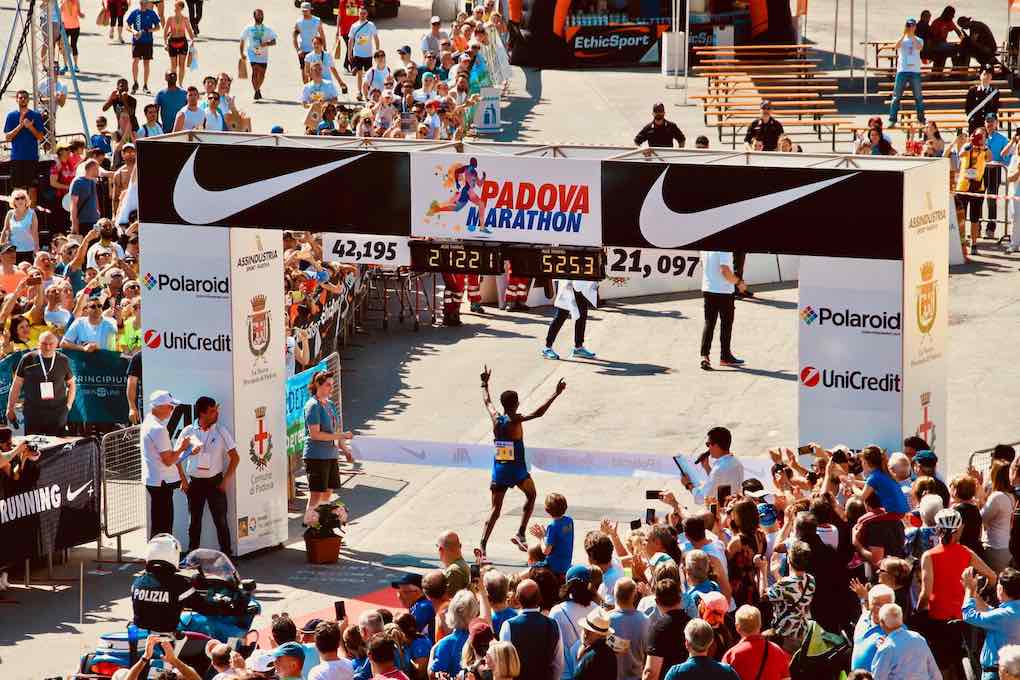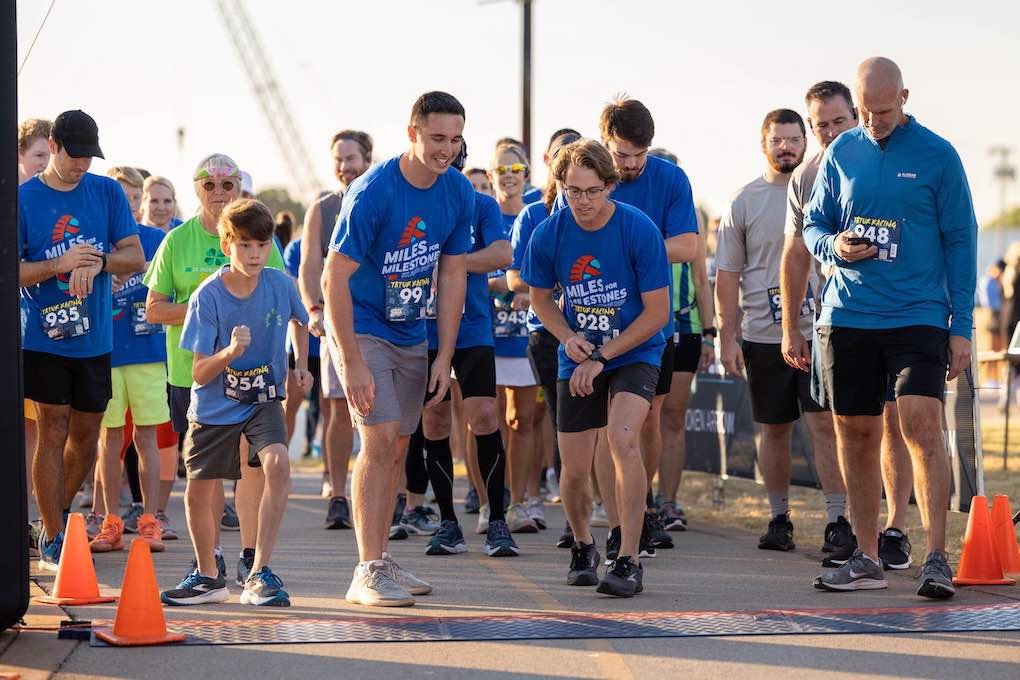A half marathon is 13.1 miles, and small pacing mistakes get pricey. Start just 15 seconds per mile too fast and you can give away over three minutes by the finish. That’s when the last five miles turn into damage control.
This guide breaks down “average” using real-world race results, then maps those numbers to paces you can train with. You’ll also see how finish times shift by age and gender, so you’re comparing yourself to the right group.
By the end, you’ll know whether your goal time looks realistic, what pace matches it, and how to verify it with splits at three, six, nine, and 12 miles. Let’s pick a target you can hold on race day.
TAKEAWAYS:
The average half-marathon time is 2:10:00. This result will bring you above 50% of participants in the world's most crowded 13.1-mile races regardless of age, gender, and experience.
Half-marathons are becoming increasingly popular, with many races taking place worldwide throughout the year.
Defining a good half-marathon time standard isn't easy. To address this, we'll analyze the 13.1 finish times from the ten biggest running races in the world, with more than 5,000 participants each. According to World Athletics, these are the Platinum and Gold Label courses, where the world records were set. They took place in 2021-2025 in Valencia (Spain), Lisbon (Portugal), Berlin (Germany), London (United Kingdom), Tokyo (Japan), Houston, Atlanta, Boston, Chicago, and New York (USA).
How Long Should It Take to Run a Half-marathon For a Healthy Person
These people mostly didn't run half-marathons before. They have a limited experience with sports but work out from time to time, live a healthy lifestyle, and have prepared for the race at least a few months ahead.
Healthy people make up at least 75% of the runners that complete the 13.1-mile run. They overtake 25% of those who are less fit or ready for the distance. For example, in a race of 1,000 runners, a regular healthy person will finish 750th or higher.
It takes, on average, between 2:15 and 2:35 to run a half-marathon for an ordinary person in average shape and physical fitness. It is an excellent result for the first 13.1-mile run and corresponds to the pace of 10:18-11:50 and the speed of 5.1-5.8 mph on a treadmill.
Average Half-marathon Times by Age and Gender
The average half-marathon times stated in the table represent the "middle" result. It means running faster than half of the athletes from your age and gender group. It's not a rule of thumb, as many factors can affect a runner's time, and each person's experience will be unique.
The average half-marathon times from the table are good targets for intermediate runners with at least a year of regular running practice, but not for the first non-stop 13.1 miles. A good goal for your first half-marathon is to complete the distance without injuries and with excitement at the finish line.
How to set your personal “good” half marathon time
A “good” half marathon time is not one magic number. It is the time you can run with steady effort, then recover well. Start with the age and gender table above. It reflects a middle result for runners like you.
From there, think in ranges, not one target. Pick two goals:
- Finish goal: complete 13.1 miles with control, even if you slow down late.
- Time goal: a pace you can hold without pushing hard in the first hour.
If this is your first half marathon, the finish goal matters most. Use the talk test. In the early miles, you should be able to say six to eight words without gasping. If you cannot, back off. Do it before fatigue forces long walk breaks.
For pacing, start a little easier than you feel you should. Run the first three miles slightly slower than goal pace. Settle in through mile 10. Then try to speed up in the final 3.1 miles. The pace chart later in this article helps you validate your mile splits.
If you expect to be out there longer than about 90 minutes, practice fueling on long runs. Even a small amount of carbs can help you stay steady late in the race.
How Long Does It Take a Beginner to Run a Half-marathon
A jogger-beginner has one year or less of regular or semi-regular training. They work out 1-3 times a week primarily for health reasons. The rookies don't have significant endurance sports experience but are in regular shape and above average physical fitness.
A beginner runner overtakes 50% of less-prepared race participants regardless of age and gender. For instance, within 1,000 racers, a beginner runner will finish the 500th or better.
It takes from 1:55 to 2:15 for a beginner to run a half-marathon. This time corresponds to 8:45-10:20 min/mile pace and 5.8-6.9 mph speed on a treadmill. It is a good half-marathon time for a novice runner with about a year of running experience that doesn't follow a particular training program.
Read also: How Long Does It Take to Run 10K?
Average Time to Run a Half-marathon For an Intermediate Runner
Intermediate runners have been training consistently for a few years and have several half-marathons behind. They run 3-4 times a week and complete 100-150 miles monthly.
The intermediate runner gets into the top 20% of fastest racers and overtakes 80% of the participants of a public running event. For example, they will obtain 200th place or higher in a race of 1,000 runners.
An intermediate runner's average half-marathon completion time is 1:35-1:55. It equals 7:15-8:46 min/mile pace and 6.8-8.3 mph speed on a treadmill. It is a good half-marathon time for a person in nice shape with proper technic, several thousand mile practices, and solid preparation.
Read also: How Long Should It Take to Run a Mile?
How Long It Takes to Run a Half-marathon For a Professional Athlete
Professional runners have been training for more than five years and have completed a lot of half-marathons and marathons. They know their capabilities and race for a particular result. The advanced joggers finish the race within 10% quickest participants. For instance, in a race of 1,000 participants, they will get into the top 100 fastest runners.
However, a professional athlete doesn't equal an elite runner. The latter compete for the podium and can set a course record. Although the former can take the top place in their age-gender group qualification.
It takes a professional athlete from 1:15 to 1:35 to run a half-marathon race. It corresponds to 6:06-7:15 min a mile pace and 8.3-9.8 mph on a treadmill. It is a good half-marathon time resulting from years of hard work and thorough preparation.
Read also: How Long It Takes to Run a Marathon?
The Current Half-marathon World Records
The world record for men's half-marathon is 57:31, set by 21-year-old Jacob Kiplimo from Uganda on November 21, 2021, during the Lisbon Half Marathon.
The current world record for women's half-marathon is 1:02:52, set by Letesenbet Gidey from Ethiopia on October 24, 2021, during the Valencia Half Marathon.
Source: worldathletics.org/records/by-category/world-records
For elite athletes, running is a job and the primary source of income. They are the fastest participants and are usually intentionally invited to race by hosts. This group is highly competitive and runs for records and financial rewards.
Elite athletes have an average half-marathon time under 1:10. It corresponds to an under 5:20 min/mile pace and more than 11 mph speed on a treadmill. This is a good half-marathon time for winning the race and setting the course's best time.
Factors that affect half-marathon completion time
Unlike one-mile or 3-mile runs where your strength is crucial, a half-marathon is more demanding to the endurance or qualities that help you maintain the pace longer. Thus, the factors that impact your 13.1-mile time are the following:
- Training level and preparation. The more training and preparation a runner puts in before the race, the faster they complete the half-marathon. Consistency in training and progressive increases in distance and intensity is crucial to improving running performance.
- Runner's fitness level. A runner's overall fitness level, including cardiovascular and muscular endurance, can significantly impact their half-marathon completion time. Excessive weight puts an additional load on your body, slows you down, and decreases your ability to keep pace.
- Race strategy. Long-distance races require runners to know the speed they are ready for and distribute their effort accordingly. The two most effective strategies for a half-marathon are a steady pace and a negative split. The latter means running the first 6.5 miles slower than the second. Most of the records in the running are set following this tactic. Lastly, it's essential to know how often and when you're going to drink and eat during the race.
- Weather conditions. Running in hot weather, humid conditions, and severe wind can slow down a runner and make it more challenging to maintain pace. On the other hand, cool, rainless, and windless conditions make running easier. So, if you are running in unsuitable weather, adjust your pace and target half-marathon time, respectively.
- The terrain of the race. The type of terrain on the race course, such as hills, gravel, or pavement, can also affect your half-marathon time. Hills and uneven terrain can slow a runner down, while flatter, more consistent terrain can make it easier to maintain a steady pace.
How to Improve Your Half-marathon Time
Consistent training is essential for runners to build up their endurance and complete the race faster than the average half-marathon time for their fitness level. Proper training programs can help runners gradually increase their distance and speed over time and without injuries. Although, be careful with widely available online half-marathon preparation programs as they primarily do not consider your previous sports background, individual physical fitness, and your body's recovery capabilities.
A typical half-marathon training plan will last several months and include running, strength training, and enough recovery time. It should also have long runs, interval training, and tempo runs. 80% of the total mileage must make slow pace running. Rest and recovery are the program's most essential and widely underestimated parts. They say, you pump muscles in the kitchen, not in a gym. The same with running; you increase your fitness level during recovery and rest.
Improving the time it takes to run a half-marathon can be challenging, and it's essential for runners to stay motivated throughout the process, even when there are no immediately noticeable improvements. Setting realistic goals, tracking progress, and having somebody to support you all can help you stay motivated. Finding a running partner or joining a running community can also provide a sense of accountability and courage.
Half-marathon Pace Chart for Goals Setting
The table below defines the most popular time targets for a 13.1-mile race. It will help you find the pace corresponding to your desired half-marathon time. Also, the 3, 6, 9, and 12 miles splits are the checkpoints to verify if you are on track.
Final Thoughts
Participating in a half-marathon is a rewarding physical and mental experience. It requires hard work and dedication, but the sense of accomplishment and personal growth from training and completing your perfect 13.1-mile race is genuinely fulfilling.
Running a half-marathon is a great way to challenge yourself, stay active, and improve your health. If you're new to running, don't be intimidated by the distance, the average half-marathon times, or the time it takes to run. With the proper preparation and training, you will be ready to conquer 13.1 miles—one step at a time.
This article is a part of our “Average Running Time” series. For more information about the average time it takes to run different distances, see the other articles from the series:
Average Time to Run a Mile
Average Time to Run 3 Miles
Average Time to Run 10K
Average Time to Run Marathon
FAQs on half-marathon times
What is an average half marathon finishing time?
There is not one “average” that fits everyone. Times swing based on age, training history, course hills, weather, and pacing. A common recreational finish range is roughly 1:45 to 2:30, with first-timers often landing closer to the slower end.
What is a realistic goal time for my first half marathon?
A realistic first goal is to finish feeling in control, not to chase a perfect time. Use a recent 5K or 10K race (or a hard solo effort) to set a ballpark, then adjust after a few long runs. If you are unsure, pick a conservative goal and try to run the second half steady.
How do I turn a goal time into a target pace?
Divide your goal finish time by 13.1 miles (or 21.1 km) to get your average pace. For example, a 2:00:00 goal is about 9:10 per mile (about 5:41 per km). Start a little slower than that pace, then settle in by mile three.
Why does my pace fall apart in the last three miles?
This usually comes from starting too fast, under-fueling, or skipping long-run practice. Try a steadier first 10 miles, then race the final 5K if you feel good. Also check basics: one long run each week, planned carbs, and heat or hills accounted for.
Is it okay to use run-walk breaks in a half marathon?
Yes, run-walk can be a smart pacing tool, not a failure. It can keep effort steady and reduce late-race fade, especially for first-timers. A simple pattern is four minutes run, one minute walk, starting early instead of waiting until you are cooked.
What should I eat and drink during a half marathon?
Most runners do best with water early, then steady carbs once the race gets long. A simple starting point is a gel every 30 to 40 minutes, plus water at aid stations as thirst allows. Practice your plan on long runs so race day is not a surprise.
What is the difference between half marathon pace and tempo pace?
Half marathon pace is the effort you can hold for the full 13.1 miles on race day. Tempo pace is a controlled hard effort you can hold for about 20 to 40 minutes in training. Tempo workouts build fitness, half marathon pace workouts teach you how to pace the race.
When should I stop running and get medical help?
Stop and get help if you have chest pain, fainting, confusion, severe shortness of breath, or trouble walking normally. Also take sudden one-sided calf swelling or sharp pain seriously. When in doubt, stop the session and get checked out.



